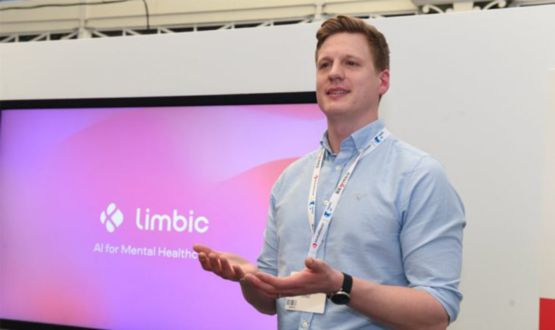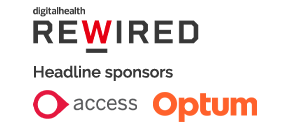‘Winning Pitchfest gave us an amazing platform to talk about our product’s impact’

It has been a very good year for Limbic, winner of the scale-up category in Pitchfest 2023. CEO Ross Harper explains how their AI innovation is improving access to mental health support, and the exciting next steps for the firm. By Lizzie Cernik
As the demand for mental health services continues to increase, Limbic’s mission is simple. They’re combining neuroscience with machine learning to create advanced AI chatbot platforms with Class IIa medical device status, which support universal access to therapy. As well as speeding up referrals for face-to-face clinical care, Limbic also helps service users access additional support at home.
“At the moment we’re seeing a mismatch between the need for care services and the availability of clinicians,” says Dr Ross Harper, Limbic CEO. “There are also other barriers for people trying to access care, including their own availability to attend therapy sessions and perceived stigma around seeking help.
“By creating AI tools that save clinical time, we’re aiming to scale service capacity, improve clinical quality, and make therapy as accessible as possible to everyone – wherever they’re based in the UK.”
Limbic has developed two products: Limbic Access, which focuses on patient referrals into care, and Limbic Care, which provides ongoing service user support between therapy sessions. Both aim to address critical challenges within the current system.
An intelligent front door for triage
“With Limbic Access we’re primarily working with NHS Talking Therapies. The tool assists with the self-referral process, providing clinicians with an intelligent front door for triaging, so that they have the right information to triage a person, and properly support them to the right care pathway,” says Harper.
The advanced AI system collects a minimum data set in order to help care providers make clinical decisions. Currently 33% of NHS Talking Therapies are using Limbic’s system, with feedback from adopters indicating a 25% reduction in clinical time being used on administrative processes.
“The online self-referral process ensures that clinical staff have detailed information about a service user before their first session. This makes it easier to guide them to the right treatments for their needs and reduces service waiting times.”
To date more than 230,000 people have been referred through Limbic Access, with some NHS providers reporting up to a 45% reduction in patients changing treatment pathways, and a 32% increase in overall referrals.
Raising their profile
Earlier this year, these successes led to Limbic being announced as the winner in the scale-up category of Digital Health Rewired Pitchfest 2023. Harper says they are delighted by the accolade, and that the external recognition has helped to raise their profile.
“The process to apply was simple, though we did spend some time perfecting our presentation. Winning has given us an amazing platform to talk about our product and how it has created a meaningful impact in NHS services and [for] hundreds of thousands of patients across the UK.
“There is also real credibility in knowing that a panel of judges have been able to look at Limbic and see what an important innovation this is.”
Using conversational AI
Alongside scaling the highly successful Limbic Access, Limbic are also ready to scale their next innovation, Limbic Care. “It uses conversational AI to promote patient engagement throughout the care journey and in-between sessions,” explains Harper.
Similar to workbooks, service users will be able to access the support they need for their care, such as CBT homework activities, all delivered through an empathetic and highly-personalised conversational app on their phone. This empowers people with the privacy and convenience to use these self-help tools in their own time while adhering to evidence-based therapeutic protocols.
“It’s important to recognise that Limbic Care is much more than a ‘ChatGPT for mental health’. It’s a highly-evidenced and compliant care companion that enables clinicians to amplify their reach and provide support outside therapy sessions, without needing to find more hours in the day,” says Harper.
Limbic Care is currently being piloted in a number of sites in England, and the company is preparing for full rollout across the UK. This is likely to encourage people who have been nervous about seeking support to do so in a completely anonymous environment; the focus on practice between sessions is also expected to decrease dropouts from services.
Building the future
Harper puts their success down to their unique approach and talented team. “We believe in converting research into impact. Our team has eight PhDs, reflecting the importance we place in scientific rigor.”
As the products continue to be developed and scaled, Harper is confident that they will be able to revolutionise the future of therapy. “Mental health affects people 24/7, not just during a weekly session or when they’ve had a crisis, so breaking down barriers and supporting people before and between typical clinical working hours is essential,” he explains.
“We want to make a difference for the people accessing services, but also overburdened clinicians by freeing up their time to focus on clinical care.”
For further information on how you can enter next year’s Pitchfest, visit Pitchfest 2024 – Digital Health Rewired The winner will have the opportunity to work with the CW Innovation Programme, a collaboration between Chelsea and Westminster Hospital NHS Foundation Trust and the trust’s charity CW+. Closing date for entries is 8 December 2023.



